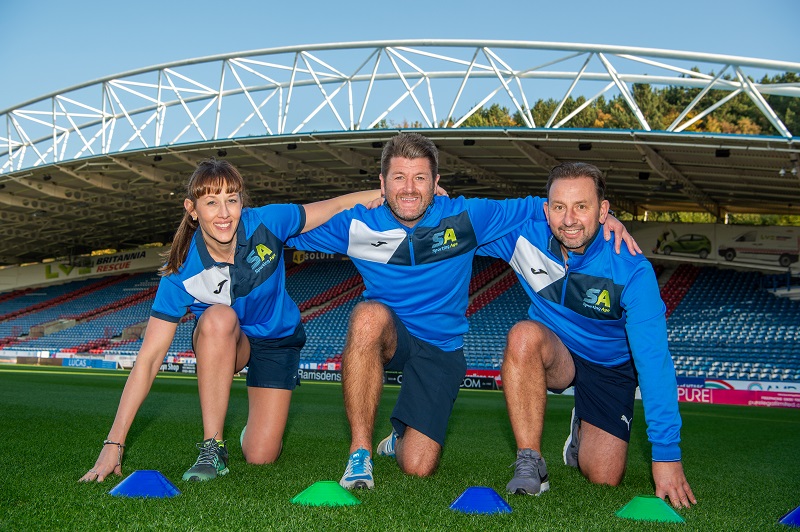What is Sporting Age?
Sporting Age exists to help improve the physical literacy of primary school children.
Our ethos is simple; if a child is engaged and participating in a level of physical activity that is tailored to their level of skill, they are much more likely to stay engaged, interested and develop a life-long awareness of the importance of physical activity as part of an ongoing healthy lifestyle.
To date, over 7,000 pupils in primary schools across Kirklees have taken the Sporting Age test and we’ve helped 89% of them to improve their confidence and competence in fundamental movement skills including running, jumping, throwing and catching.
Click to read our case study about how we’ve helped Roberttown Junior & Infant School.
Borne from the idea of children being assessed at school for a ‘reading age’ to determine the level of books they should be reading, Sporting Age uses a digital platform that takes data from a series of benchmarking tests to determine a child’s individual ‘Sporting Age’.
Each child’s ‘Sporting Age’ is then used to produce bespoke lessons plans so that teachers and schools can ensure that pupils in their class are being taught physical activity at a level that is appropriate to them and will help to develop their learning, understanding and level of ‘physical literacy’.
Case Study – Roberttown Junior & Infant School
| Stage One – baseline assessment and benchmarking |
| ·To begin the process, Sporting Age staff visited the school for Challenge Day 1 and conducted benchmark assessments of pupils in three classes (this academic year) over one morning in the school hall
·108 pupils were assessed in total over the course of Challenge Day 1 ·Each pupil was assessed with an agility run, speed bounce and target throw ·These activities have been carefully selected as each includes a combination of the 14 core Fundamental Movement Skills on which the Sporting Age programme is based |
| Stage Two – what was identified |
| ·A class average Sporting Age was calculated for each of the three classes, based on the results of Challenge Day 1
·Significant differences in levels of Sporting Age between the highest and lowest performing pupils in each of the three classes was identified: o 19 months ‘age difference’ between the highest and lowest score in Year 3 o 15 months ‘age difference’ between the highest and lowest score in Year 4 o 16 months ‘age difference’ between the highest and lowest score in Year 5 |
| Stage Three – the solution |
| ·8 weeks of stage appropriate lesson plans were designed by Sporting Age, based on the results of the benchmarking assessments
·These lesson plans concentrated on developing pupils’ Fundamental Movement Skills ·Teachers accessed the lesson plans which are user friendly, progressive and suggest easy to follow differentiated activities ·The class average Sporting Age from the benchmark assessment directed teachers to the appropriate starting point for delivering the interventions ·Teachers received training on how to use the Sporting Age platform ·Following 8 weeks of high-quality interventions from teachers, the same pupils were assessed on the same Fundamental Movement Skills as part of Challenge Day 2, to provide scientific evidence of progress · An overall impact report allows the school to demonstrate progress and impact. Teachers can report accurately to parents on how their child performed in relation to peers and suggest activities to aid further progress. |
| Stage Four – the results |
| ·96% of the pupils involved demonstrated progress in one or more of the Fundamental Movement Skills challenges
·The average Sporting Age increased across all classes involved ·The results demonstrated strengths and areas for development for each class. ·The filtering system identified the top and bottom 20% of performers in each class, allowing teachers to consider appropriate next steps/pathways ·Pupils requiring additional intervention will be encouraged to attend a “Change 4 Life” club to help develop movement skills, providing appropriate pathways ·Gifted and Talented performers will be invited to a Sporting Age XTRA festival where they will access advanced level coaching, providing appropriate pathways ·All delivering teachers stated they felt much more confident delivering activities to develop Fundamental Movement Skills ·The programme has also increased their understanding on the concept and importance of Physical Literacy ·Teachers can report accurately to parents on how each child performed in relation to peers, and suggest activities to aid further progress ·An overall impact report provided by Sporting Age allows the school to demonstrate progress and impact over the 8 weeks of interventions ·The Sporting Age programme supported the school in directly fulfilling 3 out of 5 criteria on the government’s recommended evidence template for Sports Premium Funding, these being: o the engagement of pupils in regular physical activity o raising the profile of PE and sport for whole school improvement o increasing confidence, knowledge and skills of all staff in teaching PE and sport |
For more information about Sporting Age, visit sportingage.co.uk or email andrea@sportingage.co.uk



